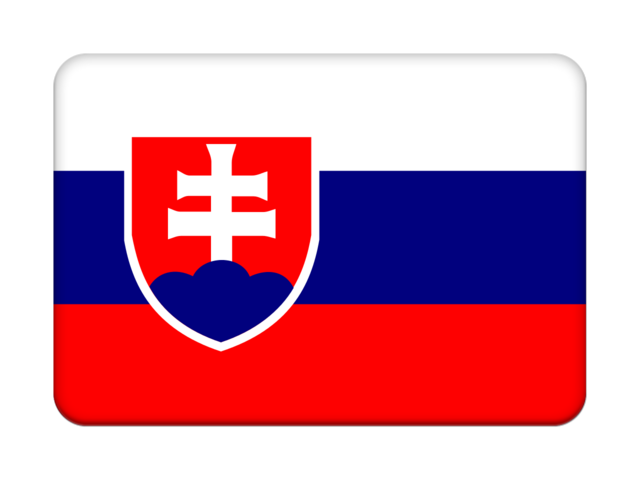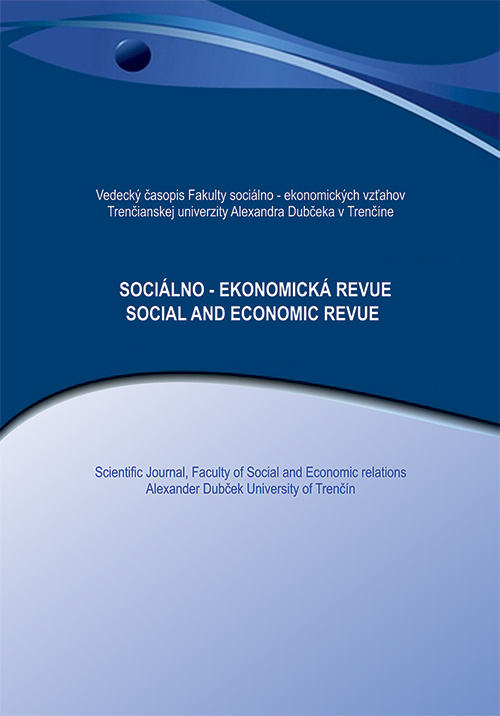EMPLOYMENT DEVELOPMENT IN THE CONTEXT OF AGENDA 2030
The aim of our scientific study was to identify and assess the specificities of the EU countries in the field of employment improvement based on the indicators “young people neither in employment nor in education and training” (NEET) and “employment rate” within the EU and to evaluate the position of the Slovak Republic. The selected indicators are determined in Agenda 2030 in the area of “Decent work and economic growth” as indicators with quantitative targets. In the scientific study, the method of analysis of the development of time series and linear regression analysis is used. We can say that the development in the Slovak Republic is favourable. However, the values of both indicators are worse than the average values in the EU. The linear regression points to a strong connection between indicators. From the derived relations, the possibilities for improvement also follow.
Vydanie: 2023/2 Strany: 14-23 Klasifikácia JEL: E24, C22
DOI: https://doi.org/10.52665/ser20230202
Kľúčové slová: Agenda 2030, employment rate, young people neither in employment nor in education, linear regression, time series
Sekcia:
Kontakty:
Eva, Grmanová, doc., RNDr., PhD.
Alexander Dubček University of Trenčín,
Faculty of Social and Economic Relations
Študentská 3, Trenčín
e-mail: eva.grmanova@tnuni.sk
Literatúra:
Adamec, V., Střelec, L., Hampel, D. (2017). Econometrics I. Teaching text. Mendelova univerzita v Brně. (reprint 2022).
Adamec, V., Střelec, L. (2020). Econometrics I. Exercise book. Mendelova univerzita v Brně.
Aina, C., Brunetti, I., Mussida, Ch., Scicchitano, S. (2021). Even more discouraged? The NEET generation at the age of COVID-19, GLO Discussion Paper, No. 863, Global Labor Organization (GLO), Essen.
Arlt, J. (1997). Regression Analysis of Non-stationary Economic Time Series. Political economy, 45(2), 281-289. [acc.: 2023-11-20]. Retrieved from: https://nb.vse.cz/~arlt/publik/a_ranecr_97.pdf
Bäckman, O., Nilsson, A. (2016). Long Term Consequences of Being not in Employment, Education or Training as a Young Adult. Stability and Change in Three Swedish Birth Cohorts’. European Societies, 18:136–157.
Cieslik, K., Barford, A., Vira, B. (2022). Young People not in Employment, Education or Training (NEET) in Sub-Saharan Africa: Sustainable Development Target 8.6 missed and reset. Journal of Youth Studies, 25:8, 1126-1147.
Dubravská, M. (2017). Status and Development of Selected Indicators of Sustainable Development of the Slovak Republic. Journal of Global Science. [acc.: 2023-11-11]. Retrieved from: https://jogsc.com/pdf/2017/4/stav.pdf.
Escudero, V., Mourelo, E.L. (2014). Understanding the Drivers of the Youth Labour Market in Kenya. 203-228. Springer.
Eurostat. (1, 2023). Young People neither in Employment nor in Education and Training (NEET), by citizenship. [acc.: 2023-12-01]. Retrieved from: https://ec.europa.eu/eurostat/databrowser/view/sdg_08_20a__custom_9162198/default/bar?lang=en
Eurostat. (2, 2023). EU SDG Indicators with Quantitative EU Targets. [acc.: 2023-12-01]. Retrieved from: https://ec.europa.eu/eurostat/cache/website/sdg/sdg_key/sdg_key_2023/img/target_indicators_en.pdf
Eurostat. (3, 2023). Employment rate, by citizenship. [acc.: 2023-12-01]. Retrieved from: https://ec.europa.eu/eurostat/databrowser/view/sdg_08_30a/default/table?lang=en
Esha, J. (2020). A Review Study on Sustainable Development Goals: Un 2030 Agenda. Our Heritage, 68(5). [acc.: 2023-12-01]. Retrieved from: https://www.researchgate.net/publication/342097533_A_Review_Study_On_sustainable_Development_Goals_UN_2030_Agenda
Huttmanová, E. (2011). Selected Aspects and Problems of Sustainable Development Assessment. In: Proceedings of the Department of Economics and Economics 2011. [acc.: 2023-11-11]. Retrieved from: https://www.pulib.sk/web/kniznica/elpub/dokument/Kotulic14/subor/11.pdf
Kubišová, K. (2021). Agenda 2030 for Sustainable Development in a Nutshell. Office of the National Council of the Slovak Republic. [acc.: 2023-11-11]. from: https://www.nrsr.sk/web/Dynamic/Download.aspx?DocID=497213
Lee, M., Christianson, H., Bietsch, K. (2016). Global and the Sustainable Development Goals. Population Bulletin, 71(2). [acc.: 2023-11-11]. Retrieved from: https://www.prb.org/wp-content/uploads/2017/04/PopulationBulletin71.2LaborEmployment_2017.pdf
Ministry of Investments, Regional Development and Informatization of Slovak Republic. (2020). Report on the Results Achieved in the National Priorities for the Implementation of the Agenda 2030 [acc.: 2023-12-01]. Retrieved from: https://mirri.gov.sk/wp-content/uploads/2020/12/SK_Sprava_dosiahnute_vysledky_A2030.pdf
Mudiriza, G., Lannoy, A.D. (2023). Profile of Young People not in Employment, Education or Training (NEET) Aged 15-24 years in South Africa: an annual update. [acc.: 2023-12-01]. Retrieved from: https://www.opensaldru.uct.ac.za/bitstream/handle/11090/1031/2023_298_Saldruwp.pdf?sequence=1
Pacáková, V. et al. (2003). Statistics for Economists. Bratislava: IUARA EDTION.
Pauhofová, I., Staněk, P., Stehlíková, B. (2019). Smart Regions in the Slovak Republic. Wolters Kluwer.
Ricciolini, E., Tiralti, A., Paolotti, L., Rocchi, L., Boggia, A. (2023). Sustainable Development according to Agenda 2030 in European Union countries: Evidence of the Enlargement Policy. Sustainable Development, 1–19.
SBA. (2021). The Concept of Smart Cities and its Impact on SMEs. [acc.: 2023-12-01]. Retrieved from: https://www.sbagency.sk/sites/default/files/koncept_smart_cities_a_jeho_vplyv_na_msp.pdf
Statistical Office of the Slovak Republic. (2023). Agenda 2030. [acc.: 2023-12-01]. Retrieved from: https://agenda2030.statistics.sk/Agenda2030/en/introduction/
Výrost, T., Baumöhl, E., Lyócsa, Š. (2013). Quantitative Methods in Econometrics III. Ekonomická univerzita v Bratislave.


